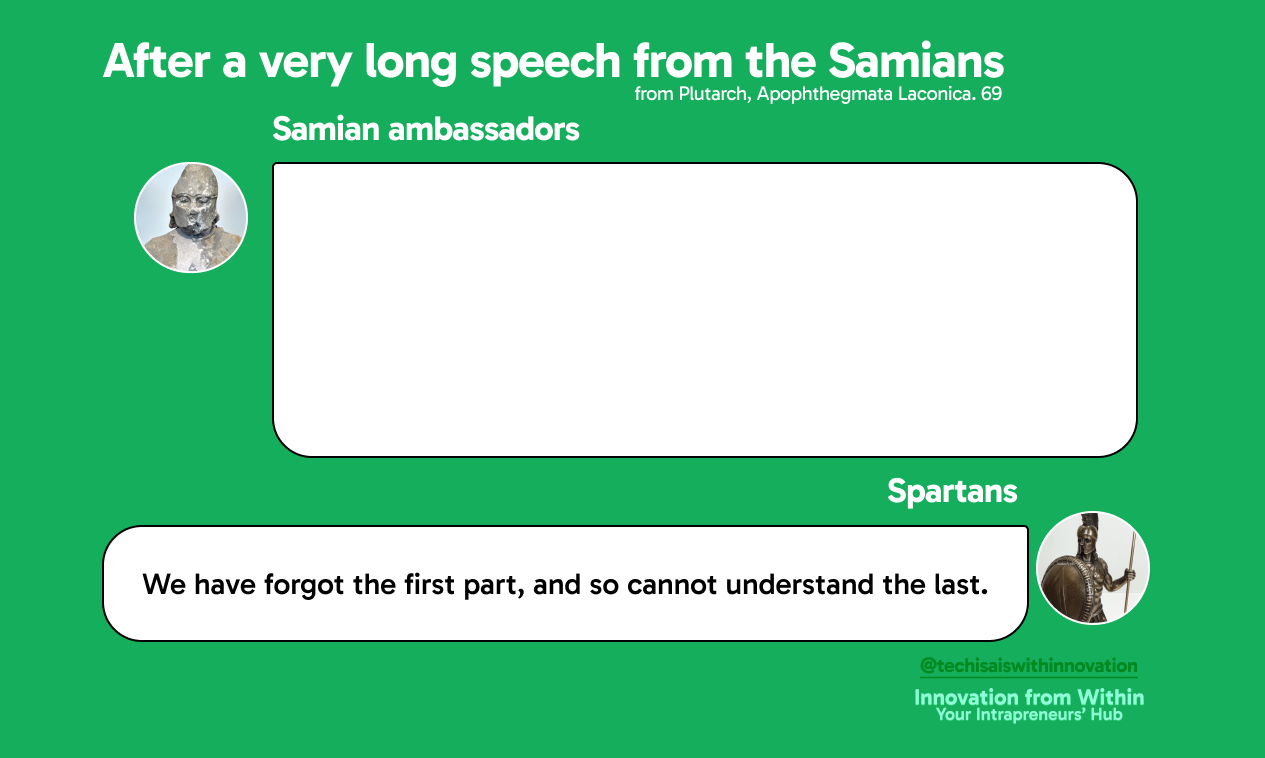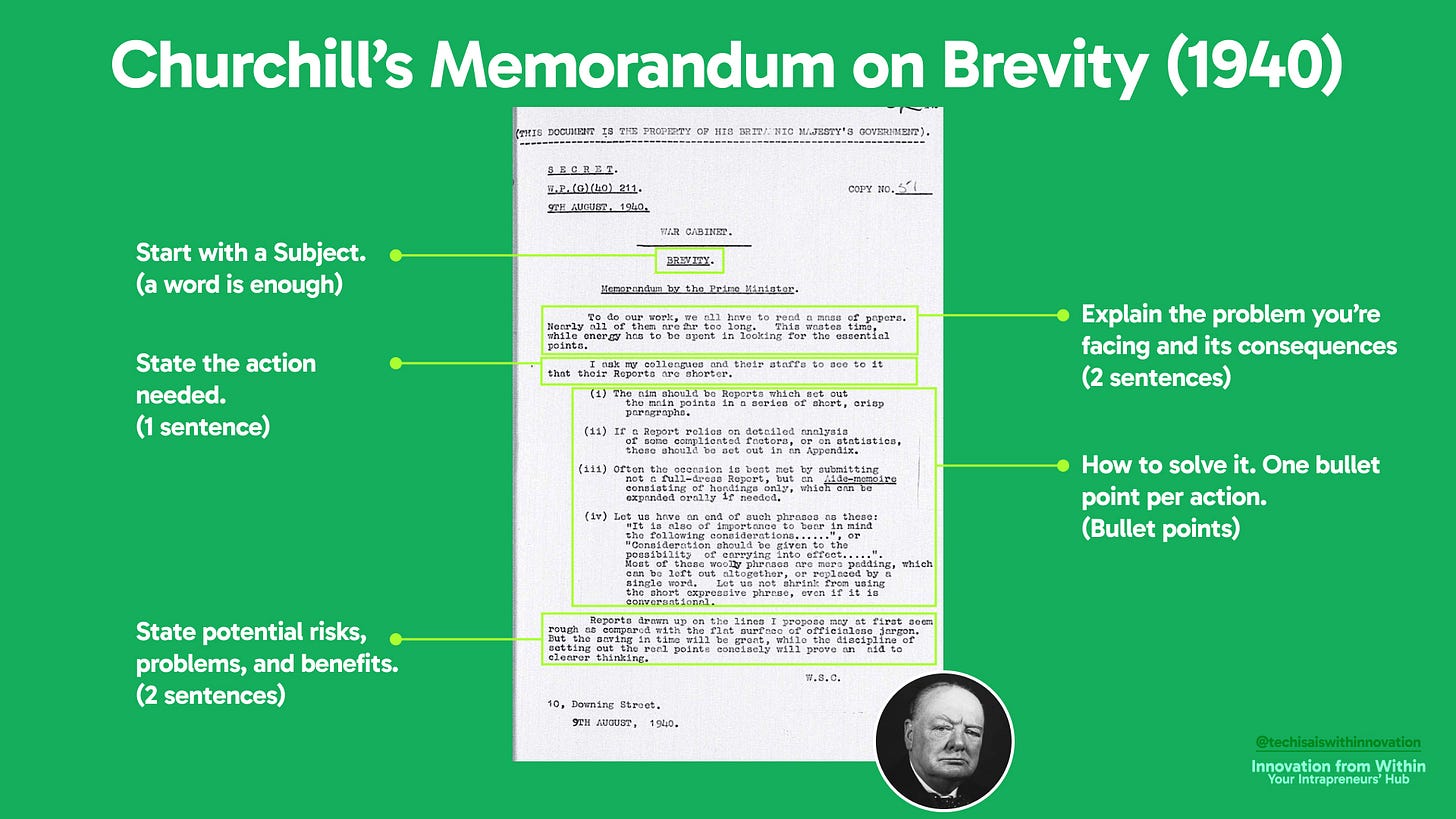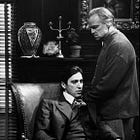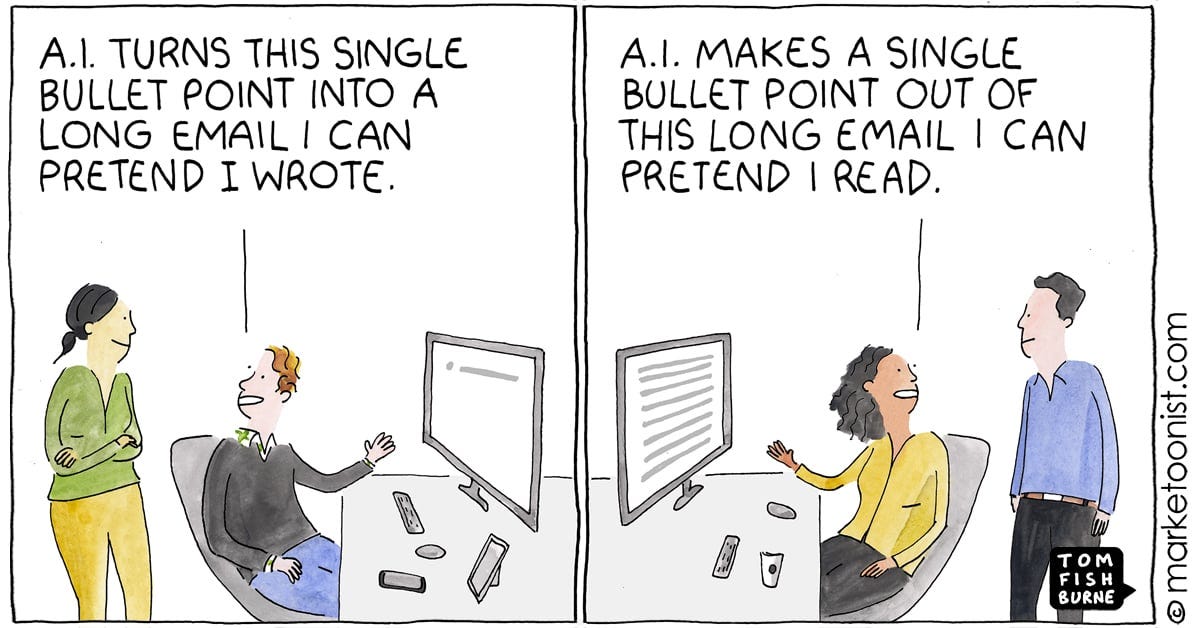Winston Churchill haunted me... (and a post on Brevity)
His face was a daily haunt, but Churchill also provided me with lessons of brevity, political (in)decision and being stern in times of need, all crucial in innovation
Today, I bring you my version of pop culture with iconic references about the importance of Brevity for aspiring entrepreneurs, intrapreneurs or anybody that wants people to listen to their idea. Here’s what I’m bringing today:
a specific set of Spartans (the Laconics)
Winston Churchill,
Kevin from The Office.
Yes, I get the irony of this post’s length about Brevity. To give proper context, I might not be as brief as I’d like, so you can find more info on the footnotes.
Before we start, let me explain why Churchill “haunted” me.
No, I don’t see dead people. It’s more lighthearted.
During my university years, his portrait was hanging over me daily in the Winston Churchill meeting room (that’s why it was named Winston Churchill after all) in the Political Studies Institute where I was a student. For three years, I exchanged glances with that painting during meetings and study time. It was… creepy.
I used to joke his painted eyes were a secret window for the Dean to watch over us, like something out of Scooby-Doo.
Once a year, the portrait even made its way to a summer conference 40 minutes away from Lisbon. This procession became a running joke among students because he did not, in fact, have to be in every room… unless his soul was inside the portrait or something. But ok, a tradition is a tradition, I guess.

Why am I bringing him up? I believe that Western society1 owes a lot to Churchill, who passed away 60 years ago this week: not just in politics and war strategy but also in innovation and, yes, being concise. As brevity is going to be our topic today, let’s start!
The Laconics and their… LacICONIC responses
Let’s travel further back to ancient Greece2: Sparta. The Spartans, or Laconics, were famous for their short yet impactful replies. In fact, the word "laconic" comes from Laconia, the region they called home. In Portuguese, the adjective “laconic” is used to describe people who don’t use many words when speaking.
Here’s an example of Plutarch, NOT a laconic with few words to say, talking about why and how the Laconics were so brief with words (this is probably 1/100 of the entire chapter):
(…) The former are those whom Plato so much praises, and likens unto skilful archers, darting forth their sentences thick and close, as it were crisped and curled one within another. To this same shrewdness of expression Lycurgus accustomed his fellow-citizens from their childhood by the exercise of silence, contracting and thickening their discourse into a compendious delivery. (…) so the Laconic way of speech has nothing of bark upon it, but by cutting off all superfluity of words, it becomes steeled and sharpened to pierce the understanding of the hearers. So their consciousness of language, so ready to turn the edge to all manner of questions, became natural by their extraordinary practice of silence. And therefore it would be very expedient for persons so much given to talk, always to have before their eyes the short and pithy sayings of those people, were it only to let them see the force and gravity which they contain. (Plutarch, De garrulitate, 17)
For the sake of brevity, here’s a few legendary examples described in various Plutarch’s books.

What is mentioned in the above image, Molon Labe, means “Come and take them.” Short, simple to understand, and quite assertive!3
It reminds me of this one, that quickly turned into a Ukrainian cry of courage after the Russian full-scale invasion in 20224.
In short, brevity matters. Not only due to the soundbites that quickly get memorized, but because saying a lot of words loses the essence of the main message. These defenders were not surrendering, and they did so in a courageous way. While these 13 defenders guarding Snake Island were first announced dead, they survived and had been taken prisoners by Russia. They were then returned due to a prisoner exchange months later.
Going back to the Spartans, though: This last one could be something your boss tells you, when you go into the details and he forgot what you were asking for.
A few well-chosen words can carry power, which probably is better than 10 minute long speeches that get forgotten. These above examples have survived millennia enough to be remembered on a Sunday afternoon in an Innovation-themed newsletter!
On Churchill’s brevity in memos
Winston Churchill was Britain’s Prime Minister during one of the most critical times in modern history: World War II. Known for his skills in giving (long) speeches (you might know at least 3 quotes from him) and leadership, Churchill understood that clarity and brevity were indispensable in a time of crisis.
In 1940, with lives on the line, Churchill issued a memo with less than 250 words. You can click here to see the original memo enlarged.
During the war, Churchill had to sift through an overwhelming amount of information from the cabinets of Defense, Intelligence, and Diplomats abroad. Reports were often overly long and filled with what he called "officialese jargon," making it difficult to act quickly.
“To do our work, we all have to read a mass of papers. Nearly all of them are far too long. This wastes time, while energy has to be spent in looking for the essential points. (…)
Reports drawn up on the lines I propose may at first seem rough (…). But the savings in time will be great, while the discipline of setting out the real points concisely will prove an aid to clearer thinking.”
Here’s how asked for it:
Subject line → 1 single word: what we wants/ expects
Problem→ 3 sentences: why it is a need
Action → 1 sentence: his request
Solution Description → 4 bullet points: how to do it.
It’s curious that he:
prefers in some cases that people bring reports with the main points in short paragraphs.
Any data or graph? Put it in an appendix.
If you’re in a meeting: just bring an “aide-memoire” with the headings you’ll talk about. If there’s doubts, you explain them orally. The headings should be enough.
Remove long sentences, they’re just “fluff”, or in Churchill’s words… padding. Prefer conversational over officialese jargon.
Benefits → 2 sentences: what it solves
If you want to read this in the website, instead of your e-mail app, click here:
Quick decisions were critical, and clarity could mean the difference between success and failure on the battlefield.
Churchill’s emphasis on brevity and straight to the point extended to innovation as well. He was the first British Prime Minister to appoint a scientific adviser, which originated a new era of collaboration between government and scientists. During the war, projects like radar development and the cracking of the Enigma code received attention and resources that had seemed impossible before.
“During the war the question was never, ’How much will it cost?’ It was, ’Can we do it and how soon can we have it?’ said Andrew Nahum, lead curator of Churchill’s Scientists. This left a heritage of extreme ambition and a lot of talented people who were keen to see what it could provide.”5
“Winston Churchill spurred scientific innovation as he dreamt of turning icebergs into aircraft carriers” in National Post
Churchill’s leadership style boiled down to this:
identify the problem,
eliminate unnecessary complexity,
act decisively.
Even today, his approach to brevity and clarity remains relevant. Whether you’re presenting an idea to executives or writing a report, keeping your message clear and to the point can make all the difference.
Why Brevity Matters for Buy-In
Don’t be a Plutarch (remember that incredibly long quote from the previous section). Executives and managers face countless decisions daily. If your request is buried in jargon or unnecessary details, it’s likely to get skipped. Brevity makes it easier for decision-makers to grasp your point and say yes.
So always remember to:
Start with the Bottom Line: State your main point upfront. There’s the BLUF (bottom-line up front) or the TL;DR which stand for “too long, didn’t read”. You can have one of them by simply stating what it is you need to answer the problem you have, already in the beginning of the report, presentation or request.
Eliminate Jargon: Use simple, clear language. Avoid acronyms: LLMs, APIs, CPOs, OKRs, sometimes they mean different things depending on context. Avoid them altogether if you can.
Be Structured: Present your ideas in logical steps.
Respect Their Time: Assume you have an elevator ride worth of time to make your case - that’s the elevator pitch: short, simple, concise. 6
Knowing when and how to adapt to your listener is key. While executives often prefer the bottom-line approach, some situations require depth and nuance. For example, a technical team may need detailed explanations, while a busy CEO might only want the summary. Tailoring your communication style to your audience ensures you strike the right balance between brevity and detail.
Don’t take brevity to extremes though
Last post, I covered something about pitching ideas to your boss, with a template, all with a “The Godfather” theme. One of the things I mention in one of the first slides of the template is that they all begin their requests by giving a KISS to Don’s hand.
Click below if you want to read the article:
In this case, giving a KISS is using the acronym KISS: Keep it simple and stupid (or Short and Simple). But it can quickly turn into a bad piece of advice if you make it too stupid (so please don’t make it too stupid).
If you’ve watched the American version of The Office, there’s an episode where Kevin (one of the accountants) decides that talking normally takes up too much time so he starts abbreviating all his words and sentences much to the confusion of the rest of the office... Here’s the video7 if you want to see it.
But his coworkers considered he was having a stroke! Being too brief can backfire. Was he saying Sea World or See the world? The time he was saving was actually not time saved. While this is from a comedy show, it does prove that brevity shouldn’t sacrifice clarity. Your audience must still understand your message.
Brevity isn’t always about reducing your words to the bare minimum but knowing what to cut and what to keep based on your audience and context.
Today’s take
Brevity is needed, and being brief the right way is an art. It might be what defines the success of your ideas!
The Spartans weaponized it, Churchill mastered it only when it came to work content, (because his speeches were on the longer end of things! But they were memorable nonetheless). Kevin from The Office reminds us not to overdo it.
AI has also brought us a (funny?) new problem: people use AI to both expand and shorten the text they’re producing / receiving, so is anyone reading it at the end? In a world flooded with content, knowing how to be concise and clear is an advantage. Not just in produced, written content, but also when speaking out loud.
It’s important to be brief, and know how balance things to have just the right amount of words needed to get the message across.
Using it well makes your message stand out, which ensures your ideas are heard. Learning it is important. I am still learning it myself.
This post is brought to you after 13h of reading, writing and editing the images with the quotes. My favorite so far, due to the topics I could bring! I hope you enjoyed this post. This really used a lot of the knowledge I’ve acquired in college, and I loved going back to my notes and essays :)
Happy Sunday!
I’m not going to delve on Churchill’s personal or political life, as that’s something that has taken multiple books for several authors. Churchill might be well-liked in Europe, due to the way he led the war against Hitler efforts in Europe, but he might also not be liked at all in India, due to the famine he didn’t help solve. He was a controversial political figure in his time, and whatever he did or didn’t do, it doesn’t quite fit this newsletter. It is how he worked that I’d like to bring here.
Not cited but read: Churchill on Science and Civilization
Not cited but read: Churchill and the "Wizard War," Part 1 - The Churchill Project - Hillsdale College
Not cited but read: Winston Churchill and his wartime passion for science - BBC News
Not cited but read: Winston Churchill's inspiring wartime speeches in Parliament - if you ask me, his best speeches were the “We shall fight on the beaches… We shall never surrender” (the favorite from the Professors in my College! We heard this quote a lot), the “Finest Hour” as well as the “Blood, toil, sweat and tears” (his first after becoming Prime-Minister).
In college I had to study the History of the Peloponnesian War, as written by Thucydides. While we mostly read Thucydides and Herodotus’ works, for this post I went with Plutarch, as the quotes can be used directly from the book.
Here’s the original quotes if you want to read them:
Plutarch, De garrulitate, sections 14-17
Plutarch • Sayings of Spartans — Anonymous
Plutarch, Lives, Volume IX: Demetrius and Antony. Pyrrhus and Gaius Marius, 104-105
I had the delight of reading past essays to prepare this specific post. It is due to these classes with our professor that I learned about Churchill’s memorandum on Brevity. We had to learn from and use this memorandum as an example of a good essay structure and length (but ours required a minimum of 1500 words…). If I hadn’t taken this class 7 years ago, this post wouldn’t exist.
One thing that helps being brief is knowing how to take notes for when you’re speaking (I usually never prepare anything long!). It’s worse to remember an entire speech if you write it down word for word. My summaries and class notes were always prioritizing visual cues and mind maps. If you’re curious about my notes and some of my learnings on the Peloponnesian War, which were used for this post, here it is: https://docs.google.com/document/d/1POanRRXGVp8WNxULp8g5X22cZVlOzAotm1VQbu3P8og/edit?usp=sharing This is how I memorized a book of 800 pages for an oral exam.
I’m currently taking time to learn more about sketchnoting and visual storytelling, and revisiting old notes from college is a fun exercise to see how I’ve always prioritized short notes to remember lots of information.
The video can be also seen here:















Subject: Brevity
Problem: None. This brilliantly balances depth and humour while discussing brevity. The self-awareness of its length adds charm and wit. 🤣
Action: Continue this engaging approach, blending detail and actionable insights with relatable anecdotes.
Solution Description:
👁️🗨️Historical examples enrich the narrative and make the lessons memorable.
👁️🗨️The humour keeps readers entertained.
👁️🗨️Practical takeaways provide immediate value.
👁️🗨️The self-aware tone creates a strong connection with readers.
Benefits:
Readers leave informed, entertained, and eager for more. Your style bridges history, business and humour, making complex ideas accessible to a broad audience.
****
Using Churchills template takes me much longer, but I can see how it would help the reader. i can understand how you spent 13 hours on this and how if you only had 6 hours to do it, it could have been much longer.
I can say that I am going to take brevity into my worklife, but my Substack life will stay meandering with a touch of waffle. 🤣
Brevity is indeed needed. Often, less is more when you are trying to craft a talk, post or note. Also, I learned the word, "laconic". Never knew that one! Thanks Francisca, I always learn something.